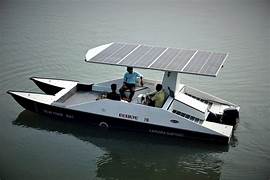In a major move towards green transport and tourism, the much-awaited Yamuna waterway project is on the cusp of taking off. From the latter half of May 2025, solar-powered boats will become functional between Gokul and Vrindavan, providing a green option for tourists and pilgrims both.
Project Overview
The initiative, spearheaded by the Uttar Pradesh Braj Teerth Vikas Parishad (UPBTVP) in collaboration with the Inland Waterways Authority of India (IWAI), aims to enhance connectivity along a 22-kilometer stretch of the Yamuna River. This route, extending from Vasudev Vatika in Gokul to Jugal Kishore Ghat in Vrindavan, will feature a total of 11 jetties. In the first phase, eight jetties are slated for construction, with completion targeted by the end of May.
Eco-Friendly Transport
Keeping in mind the navigational limitations and shallow stretches of the Yamuna, the project will adopt lightweight fiber boats run on solar and battery power, avoiding the conventional diesel and petrol engine-based boats. This is a step towards eco-friendliness and an effort to minimize the carbon footprint of river transport.
Infrastructure and Amenities
In addition to the waterway, tenders have also been invited for constructing public amenities along the projected jetties. Local boatmen would also be incorporated in the project, boosting local livelihoods and community participation as well. Public infrastructure and access roads would be constructed by the Mathura-Vrindavan Development Authority (MVDA), whereas IWAI would construct jetties. The cost of the project would be around an approximate ₹28.35 crore.
Overcoming Challenges
In order to counter low water levels at some places, a joint committee will prepare detailed surveys. Furthermore, issues regarding pontoon bridges at Devraha Baba Ghat and Keshi Ghat, already causing hindrances to free movement, are being tackled by a technical team that is empowered to seek workable solutions.
Increasing Pilgrimage and Tourism
This project can help in offering a better religious and cultural experience to pilgrims traveling to the holy towns of Gokul and Vrindavan. By offering an eco-friendly and clean means of transport, the project is in line with the overall objective of encouraging sustainable pilgrimage tourism.

